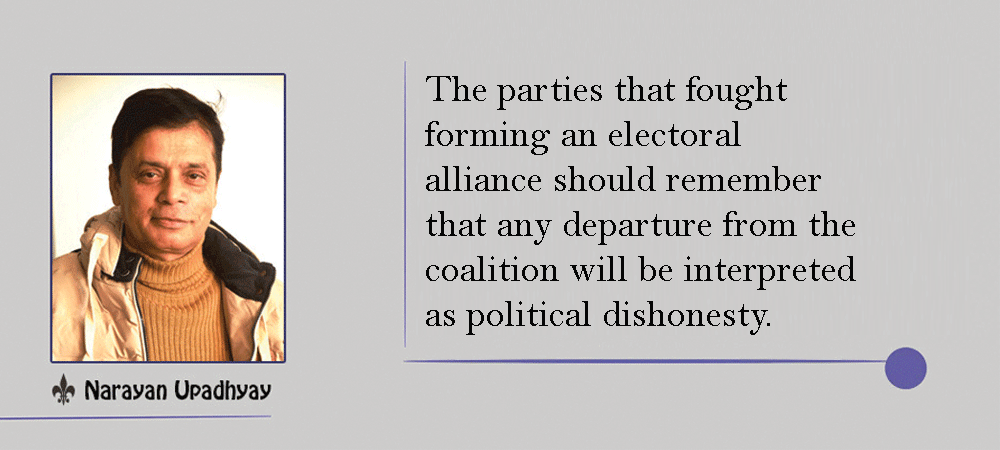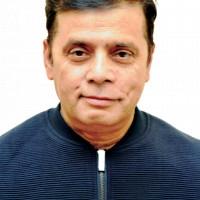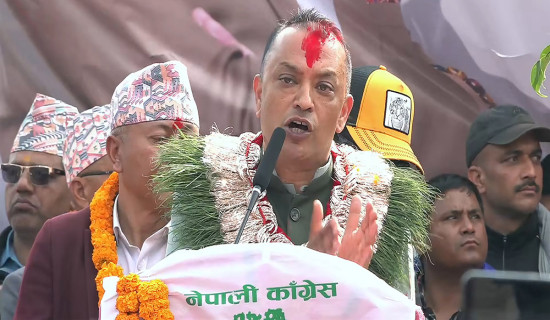- Thursday, 26 February 2026
Race For PM: Let Rationality Prevail
Even after failing to secure a clear majority in the November 20 election, the Nepali Congress and the CPN-Maoist Centre, the two ruling alliance partners, are currently in a race to form a new government under their leadership. The race looks to have heated after the President's Office urged the parties representing in House of Representatives (HoR) to stake their claim to form a new government by next Sunday.
So far, senior leaders of both parties have maintained their position and mobilised their agents to create a favourable environment for them to become prime minister for the first half of the next government's five-year mandate. The Prachanda-led Maoist Centre has upped its pitch, asking the NC to enable it to create a new coalition government headed by its chairman. However, NC President and Prime Minister Sher Bahadur Deuba has asserted that he would head the next coalition government for the same time period. His party has sought the presidency for one of its senior members. The Congress has suggested the Speaker's chair to a Maoist party member. So far, neither party has reached an agreement to stop the heated race for PM’s chair.
Coalition politics
Given the people's mandate in the general elections, rationality must prevail among the NC and Maoist leaders. They must not make too much spectacle over who will head the next administration. The prevailing wisdom is that the NC, which has emerged as the single biggest party in the HoR, should be given the chance to head the next government with the support of the other coalition partners. However, given the dynamics of the existing coalition politics, the Maoist Centre maintains the right to seek the PM's seat. Maoists claim the NC has already been in power for one and a half years. They say that they should now be in charge of the government. Political observers feel that the deadlock may be broken if both major parties make an honest agreement to share the PM’s chair on a rotational basis while all coalition members participate in the new government.
PM Deuba and Maoist Centre chair Prachanda seem to vie for the premiership for the first two years for another reason. Our constitution prohibits any party from deposing a prime minister via a no-confidence resolution in the House for two or two and a half years, allowing the next PM to enjoy a peaceful tenure in office. Given the vagaries of Nepali politics and the current arithmetic of seats in the House, where the ruling coalition has only around 136 seats, still two short of the magical number 138 in the 275-member HoR, anything can happen once the new PM has completed two years in office. Other parties and independent MPs must extend their support to the alliance in order to enable it to form a strong government.
To destabilise the governing coalition, leaders from the CPN-UML, including its chair KP Sharma Oli, have made every effort. They have persuaded the Maoist and CPN-Unified Socialist to join them in forming the new administration. They also advocated that after joining forces with the UML-led coalition, the Maoist chair will become Prime Minister first. The Maoist tryst with the CPN-UML, however, looks distant because of the existing bad blood between Prachanda and Oli. But no one can predict how things will turn out in Nepali politics, where parties may dissolve coalitions and join forces with competitors if they cannot gain an advantage inside the alliance or in government seats.
For example, when the ruling alliance was taking part in the electoral seat allocation process, one of its important allies, Upendra Yadav's Janata Samajbadi Party, departed the partnership, alleging a lack of seats to fight the November 20 elections. Surprisingly, it was reunited with the CPN-UML, with whom it had broken ranks a year earlier. Yadav's party failed to secure the number of seats it sought and is now nursing its wounds. Some Maoist and UML leaders are heard arguing that their party had left the door open for any force to join in forming the new government. Many political pundits see such utterances as little more than a means of increasing pressure on the NC. The parties that fought forming an electoral alliance should remember that any departure from the coalition will be interpreted as political dishonesty: the people's mandate in the general election instructed the ruling alliance to build its government, while the UML, which emerged as the second largest party in the House, must play the role of constructive opposition.
Open plea
The coalition has no choice but to establish a new government by splitting ministerial portfolios and other constitutional roles among itself in order to provide the nation with a stable administration. The partners, particularly the Maoist Centre and its followers, may overcome the current deadlock produced by two major parties embroiled in a prime ministerial campaign if they examine the current number of seats each partner has gained. Here, it becomes natural for the NC president to run for the Prime Minister. Deuba has made an open plea to resign after serving half of the five-year tenure. Prachanda could do well if he recalls Deuba is not like the UML chair Oli, who broke the gentleman's agreement by refusing to give up his PM position to the Maoists while the Nepal Communist Party was in power.
In conclusion, coalition partners must remember not to diverge from the mandate that the people gave them in the election. They must not disrupt the present coalition for at least the next five years, which will offer much-needed stability to the nation. They must keep their pledges in order to form a new government and nominate candidates for presidential and other constitutional positions in accordance with the spirit of coalition politics, which requires a greater degree of integrity from all ruling parties.
(Upadhyay is Managing Editor of this daily.)

















